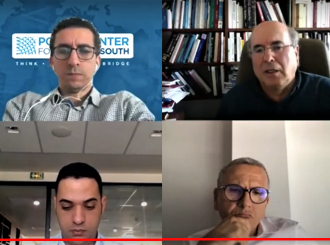
Rabat, June 16, 2020 (ECA) – Can the post COVID19 economic context provide Morocco, and more generally North Africa, with an opportunity to reorient and accelerate their structural transformation?
Three experts gathered on June 10, 2020 for a joint webinar by the ECA Office in North Africa and the Moroccan think tank Policy Center for the New South (PCNS) under the theme “Structural transformation of the Moroccan economy: before and post-COVID19” examined the economic impact of the pandemic on Morocco’s structural transformation process, and new opportunities generated by the reorganization of the global value chains in the wake of the pandemic.
According to Zoubir Benhamouche, an economist at the ECA office in North Africa, Morocco and the rest of North Africa were experiencing, prior to the COVID19 pandemic, a slowdown in productivity growth. Moreover North Africa experienced weak structural transformation.
Structural transformation is defined as the process of reallocating production factors such as labour or capital between sectors. Structural transformation is positive when factors of production reallocate from less to more productive sectors/activities.
Over the last few months, COVID19 has introduced new constraints, which call into question well established global value chains, leading many countries to redefine their economic strategies, and impacting key trading partners for Morocco, such as Europe.
"We expect economic sovereignty to become a key issue, which will determine development and growth policies, as well as medium and long-term economic recovery plans," said Larbi Jaïdi, a Senior Fellow at PCNS.
This will trigger significant changes without necessarily going so far as to bring about a complete paradigm shift: "Today, the fragmentation model is such that countries are unable to revert to older models, which would have allowed them to take ownership of all segments of industrial activity," said Larbi Jaïdi, adding that nowadays, States are not the only actors influencing globalization dynamics as multinationals, and behind them, companies of various sizes, also play a role.
"I don't think COVID19 will cause the kind of shock that would trigger a complete overhaul of economic systems or a structural change in the basic principles of trade and investment. International Investors will continue to seek the most profitable investment opportunities they can find, companies will seek to sell their products in promising markets providing them with better returns, and consumers are not willing to pay more or see their wellbeing deteriorate due to possible readjustments, ” said Abdelaziz Aïtali, Senior Economist at PCNS.
Despite this, the revision of global value chains in the wake of COVID19 and trade tensions between major world powers such as the US and China should lead to some forms of localization or relocalization depending on sectors, the degree of strategic interest, logistical aspects, etc, he added.
To seize the opportunities thus generated, countries like Morocco and its neighbors need to reduce obstacles to the efficient distribution of resources within their economies, while leaving their governments enough margin of maneuver to create incentives for targeted sectors, as part of their strategies to facilitate the emergence of new national industries and champions.
A special attention should therefore be paid to distortions which limit the reallocation of resources for the benefit of more efficient companies, caused by various factors such as taxes, administrative obstacles, or corruption, and which reduce potential productivity gains, thus slowing down structural transformation, warned Benhamouche.
Other key factors that will play a role in countries’ ability to seize the opportunities generated by the new global economic context include research and development, digital transformation and intellectual property, and the revision of free trade agreements with a controlled liberalization of the service sector, a key generator of added value and employment within the Moroccan economy.
Note to editors
ECA is one of the five regional commissions of the United Nations Economic and Social Council (ECOSOC). Its Office for North Africa aims to support the development of seven countries across the sub region (Algeria, Egypt, Libya, Morocco, Mauritania, Tunisia and Sudan) by helping them formulate and implement policies and programs that support their economic and social transformation.
The Policy Center for the New South (PCNS) is a Moroccan think tank aiming to contribute to the improvement of economic and social public policies that challenge Morocco and the rest of Africa as integral parts of the global South. The PCNS pleads for an open, accountable and enterprising "new South" that defines its own narratives and mental maps around the Mediterranean and South Atlantic basins.
Click here to watch the meeting video recording: https://www.youtube.com/watch?v=H5BAHGq_Fic&feature=youtu.be
Issued by
Communication Team
Economic Commission for Africa
Office for North Africa
Tel: +212 (0) 537 548 749
Email: filali-ansary@un.org; cea.an.coms@gmail.com